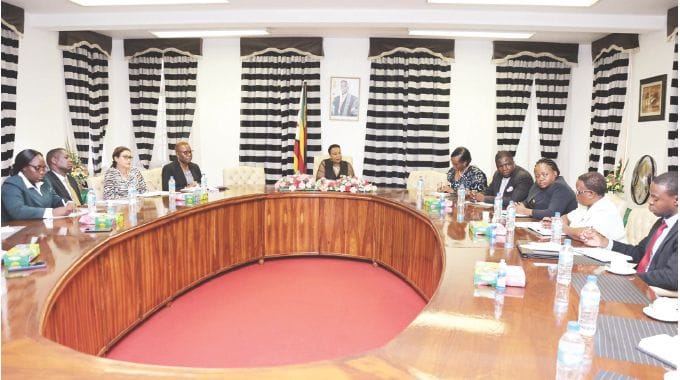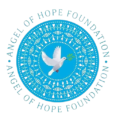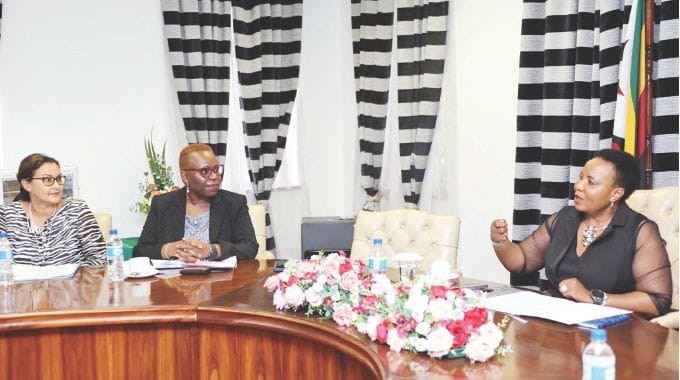Unicef rep pays courtesy call on First Lady
Tendai Rupapa
Newly-Appointed Unicef representative in Zimbabwe Mrs Etona Ekole, the organisation’s Chief of HIV/Aids Adolescents youth and gender, and Government officials drawn from several ministries paid a courtesy call on First Lady Dr Auxillia Mnangagwa where they had heart-to-heart discussions on a wide range of issues concerning children, including prospects for synergies.
Among those who attended yesterday’s meeting were officials from the ministries of Primary and Secondary Education and Public Service, Labour and Social Welfare
The First Lady, who has a passion for the welfare of children, has many programmes for learners including Gota/Nhanga/Ixhiba aimed at promoting good morals among children.
She also tackles drug and substance abuse through sport and holds interactive sessions with children teaching them the effects of drug abuse. She also warns communities against selling these harmful substances to children.
The First Lady also leads from the front in fighting child marriages, while advocating that children who fall pregnant must be given a second chance and return to school so that they realise their full potential.
Children living and working on the streets also benefit from the First Lady’s programmes as they have been housed at Dr Auxillia Mnangagwa’s children’s home in Chiredzi and in Mbare at her Skills Development Centre where apart from going to school, they are being equipped with skills like carpentry, poultry and gardening so that they can learn a decent living in the future.

Mrs Ekole said it was an honour to be welcomed at Zimbabwe House and to see where a lot of philanthropic work happens and the impulse for so many great ideas and actions.
“We really are here as we have looked for an opportunity to meet with you Amai so that we could perhaps discuss synergies that Unicef may have with the great work that you do. And already we have benefited from much of your support. I first met you in Victoria Falls during the celebrations of the regional celebrations for World Children’s Day. What a great celebration that was. What a great animation and facilitation of children you did. I was so impressed. And we learned so much as well. So really, it’s an opportunity to see how Unicef can continue to work with you and your foundation, in promoting the rights of children and how you could also serve as a voice for the work that Unicef is doing, given all the platforms that you occupy, both in the country as well as externally,” she said.
The Unicef representative hailed the First Lady for her interventions, saying they will continue to advocate for the rights of children, especially adolescent girls who require a lot of support.
“I mean, the basis of the foundation of any society is really the work that women do. And so, if we have so many young girls dropping out of school, so many young girls who are not protected from sexual violence, and exploitation, and so many young girls who also take on too much responsibility before their time, then we won’t have that productive workforce later on.
“We are also very much heartened by the work that you do on HIV and AIDS. And we seek your support also in helping the system, the UN system as a whole, but Unicef in particular, in the efforts that we are putting forward to address issues of paediatric HIV. Because we see that vertical transmission from mother to child is still very present. But also, you know, adolescent girls, more than any other population, are being exposed and run the risk of contracting Aids more than any other population,” she said.
Mrs Ekole also praised the First Lady for the work that she is doing countrywide.
“We look up to you, Your Excellency, as we pay attention to children’s education. Your Angel of Hope Foundation is doing critical work around children,” she said.
In response, the First Lady expressed gratitude to Unicef for its work in the country and for seeking to work with her Angel of Hope Foundation.
“We have had Unicef in Zimbabwe for a long time and it has been working with the Government. I am grateful that today you are here to find areas where you can work with my office and my Angel of Hope Foundation, especially on health and education of our children. I would also want to commend Unicef for the exceptional organisation of last year’s regional Children’s Day. It brought together children from different countries.
“We separated boys from girls and held Gota/Nhanga/Ixhiba. I did this so that we could hear exactly what is happening with the girls and the boys and also, to discuss with the elders what is expected of them. The girls had a lot of questions, they asked us elders, so many questions they wanted to learn from us. And they were so open to even asking everything concerning the girl child. I liked it very much. That openness coming from them showed me that they were hungry to know exactly who is that girl. Who is she? What is expected of her? It was a very warm and educative conversation that we had. I also want to see that continuing, the children coming together, sharing ideas and also me as the First Lady of Zimbabwe also visiting other countries meeting my fellow First Ladies and holding similar discussions with the children there like we did in Victoria Falls,” she said.
Girls and boys, the First Lady said, should know their responsibilities and what is expected of them.
“We are here to help our children. Our girls are the mothers of tomorrow, so this is the time when we need to teach them good morals. What we see today is that some parents no longer have time with their children because everything starts at home, so something is lacking within the family unit. So, we are saying, okay, what can we do? We cannot let our girls do as they please just like that.
“I have also taken this same issue to the parents so that we teach our children and they have good morals. We do not want blame games that is why I meet with both the father and the mother. I am deeply committed to ensuring that Zimbabwean children grow up with a strong sense of identity, cultural pride and moral values. Every country has different cultures and norms that they follow.
“Countries are different, but we have a way of teaching our children, which is not burdening our children. In Zimbabwe, we emphasise our children go to school and be responsible people and work hard in school so that they have their own future which is emulated by many. I also introduced the girl’s and boy’s camps where I take them separately to the outskirts and I teach them all what is expected of a girl child and a boy child. I give them the floor to ask anything,” she said.
Dr Mnangagwa gave the team a glimpse into her work and the various interventions she is undertaking in the health sector.
“I am also in the health sector, thousands of adolescent girls have gone through human papillomavirus (HPV) vaccination, a programme I advocated and which is still ongoing. Our girls are even indulging in sexual activities at tender ages and I am saying, I think, as First Ladies we need to sit down, put our heads together and look closely at these issues affecting our children, especially the girl child. Our children both boys and girls are being destroyed by drugs, the menace has spread across countries.
“I also managed to take children from the streets and placed them at Dr Auxillia Mnangagwa’s children’s home in Chiredzi while some are at my Mbare Skills Development Centre. I am also empowering women through various ways including education and income generating projects. This has helped in lowering GBV cases. So, your coming in will see us working together so that we have that morally upright girl child and boy child. I will invite you when I have some of these programmes. I thank you very much for coming here,” she said.
Speaking at the same occasion, Mrs Jacqueline Kabambe Unicef Chief of HIV/AIDS, Adolescents Youth and Gender said a lot needed to be done to curb the spread of HIV/Aids.
“The global target is that at least 95 percent of everyone living with HIV should be on treatment. The others we managed to put them on treatment, the children are lagging behind around 60, 63 and 68 and it’s a big constituency. At the same time, the adolescents that we are talking about, the girls especially, that’s where new infections are coming up. When you look at the statistics, you see that new infections are high among adolescent girls, and young women, when you compare them to adolescent boys and young men. And when we look at what is driving this, especially why are we having new infections?
“You find that pregnant women are not coming on time for antenatal. So, during that time when they delay coming for antenatal, if they were positive, then they pass on the virus. Sometimes they are there, they have accessed ART, and they drop out in the process. Then we also have cases whereby some who are breastfeeding are acquiring new infections. So, there is a combination of things that are driving these new infections among women and children. We really need your help on this Amai as we talk to women through you. We also look forward to your programmes as you also engage men on issues of HIV/AIDS. We wish to work closely with your office,” she said.
She further thanked the First Lady for her efforts in fighting HIV/Aids and commended Zimbabwe for achieving the 95-95-95 target.
Mr Shingirai Paungano from the Ministry of Public Service, Labour and Social Welfare praised the First Lady for her countless programmes aimed at educating and protecting young people countrywide.
“We thank you for the work that you are doing particularly for children.
“ I for one have seen the work that you have been doing through the Nhanga/Gota/Ixhiba and also through the other teachings that you have been emphasising. Even just now, you were speaking about how you are also working with parents to promote good morals among children which also dovetails with our own culture as Zimbabweans because you see that as we strengthen families, parent and caregiver support, we will be able to prevent many things that we are talking about right now, one of them being drug and substance abuse and also children who are living and working on the streets. Most of these children, if you dig deep into their background, you find that most of these children whom we see on the streets, have parents and some of them have relatives but it’s because of poor parenting that these children end up destitute so this is an area where we also need your support and also your direction to come up with a national parenting model that helps to address some of these challenges that we are grappling with. I know that with your support we will be able to gain the confidence of parents, some of whom have been adamant, but I know because of your influence and position, they will be compelled to do the good thing,” he said.
Similar sentiments were echoed by Mrs Olica Kaira from the Ministry of Primary and Secondary Education.
“We have seen a lot of progress and improvement amongst a number of our wayward pupils who have gone through your Gota/Nhanga/Ixhiba Amai. As a Ministry, we appreciate you. We are also happy Amai on the re-entry policy for former street kids moreso those in Mbare and Chambuta, they are doing very well. Amai as a Ministry we are there to support your vision of seeing every child accessing education despite circumstances. We appreciate all the philanthropy you are doing in support of the heritage-based curriculum. Amai you are also looking at issues of equity, where the urban and rural divide is somehow bridged, the most disadvantaged, the most vulnerable, you reach out to them.
“And Your Excellency, I do attest that Unicef is an all-weather friend to the Government of Zimbabwe. They do assist the Ministry of Primary and Secondary Education. We also look at issues of inclusivity, where everyone is brought on board, just like Her Excellency’s philanthropic work, where no one is left behind, no place is left behind, and no child is left behind. Yes, we have our challenges, but we have our success stories as the ministry. Another strategy and intervention amongst the challenges that the ministry has, Your Excellency, is the embracing and adoption of the early warning system,” she said.
Mrs Kaira said the early warning system was adopted following the realisation that several secondary girls were dropping out of school due to issues like teenage pregnancy and early marriages.
“We now have the system in place we have the handbooks, and we have piloted the project in 104 secondary schools. We are now reaching out, scaling out to quite several secondary schools. And from the 104, we did realise some successes, we noted that the girls were returning to school through the early warning system intervention, and because of that indicator, we are saying we will continue with that,” she said. – Herald

